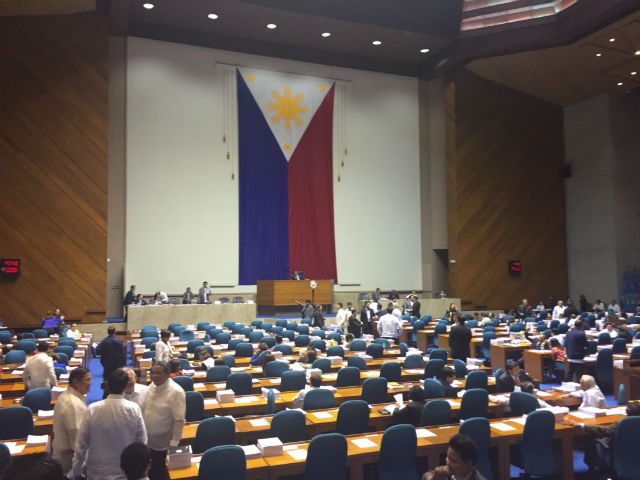SUMMARY
This is AI generated summarization, which may have errors. For context, always refer to the full article.

MANILA, Philippines – The House of Representatives on Wednesday, December 7, passed on second reading the measure seeking to impose a two-tier excise tax structure for cigarettes.
Through an ayes and nays vote, lawmakers approved House Bill (HB) Number 4144, the measure that would amend Section 145 (c) of the National Internal Revenue Code.
The bill proposes that a pack of cigarettes with a net retail price of P11.50 and below would be taxed P32, while cigarette packs that cost more than P11.50 would be taxed P36.
If passed into law, HB Number 4144 would block the full implementation of Republic Act Number 10351 or the landmark Sin Tax Reform Law of 2012 passed under the Aquino administration.
The law mandates that a unitary tax rate of P30 be imposed on all cigarette packs – regardless of price – by 2017. (READ: Bloomberg lauds PH for sin tax law)
Getting the bill approved on second reading took two House sessions – one on December 6 and another on December 7. The House committee on ways and means chaired by Quirino Representative Dakila Cua approved HB Number 4144 on December 5.
Cua said that HB Number 4144 would be generating an additional P14 billion in government revenue from excise tax on cigarettes for the first year of its implementation.
On Wednesday, Deputy Speaker Pia Cayetano questioned why the House panel still approved the bill despite “strong” opposition from the Department of Finance. (READ: DOF: Bill imposing 2-tier tax on cigarettes won’t benefit farmers)
The department had argued that expenditure policy, not HB Number 4144, would help address the woes of tobacco farmers, the primary purpose of the measure.
“That is being opposed by the Department of Finance and the Department of Health. So despite the objections of the two major agencies and the Department of Finance, which is the body that will implement the collection of the taxation, the committee is of the view that a two-tiered system should be put in place and that a unitary system should not be even given a chance?” asked Cayetano, who was the principal sponsor of the Sin Tax Law when she was still senator.
Cua explained that his committee does not intend to ignore the DOF’s postion.
“That is not the view of this representation, your honor. First let me note that this Congress is an independent institution from that of the executive. We value their inputs. We always respect their opinions. We even solicit their position papers and we hear their arguments, but at the end of the day, we the representatives of the people have to decide based on our consciences and the interest of our constituents,” he said.
“Sa amin po, Mr Speaker, ang amin pong pananaw ay ang panukalang ito ay nasa ayos po. Kaya po aming isinusulong ang panukalang ng ating kasamahan,” added Cua.
(For us, Mr Speaker, this measure is proper. That’s why we are pushing for this bill that was filed by one of our committee members.)
He also responded to criticism that HB Number 4144 would be making cigarettes more accessible to the youth and the poor.
“Pinag-aralan po namin at pinag-isipan nang matagal, mr speaker. Ang paniniwala po namin, tulad ng aming paniniwala kanina sa ating mga kasamahan, ay mas nakakabawas ng smoking po o paninigarilyo ang panukalang ito. Ito ay mas makakapag-discourage ng mga first-time smokers dahil ang pinapanukala natin ay ‘di hamak na mas mataas na buwis na P32 for the lower tier and P36 for the higher tier as compared to the scheduled P30 unitary tax in 2017,” said Cua.
(We studied this thoroughly, Mr Speaker. Our belief is that the measure would lessen instances of smoking. It would discourage first-time smokers because the P32 tax for the lower tier and P36 for the higher tier are much higher compared to the scheduled P30 unitary tax in 2017.)
He explained that those using cigarettes under the higher tax tier may indeed opt to buy cigarettes falling under the lower tier.
“Pero kung ang mas murang sigarilyo ay mas mahal pa rin sa scheduled P30 lamang na tax, then hindi po ba mas babawas ang smoking sa panukalang ito? (But if the cheaper cigarettes would still be more expensive compared to the scheduled P30 tax, then won’t this measure lessen smoking?)” said Cua.
HB Number 4144 now only needs to be sponsored one more time at the plenary session before being passed on 3rd and final reading and transmitted to the Senate.
The 1987 Constitution mandates that all tax measures must first come from the House of Representatives. – Rappler.com
Add a comment
How does this make you feel?
There are no comments yet. Add your comment to start the conversation.